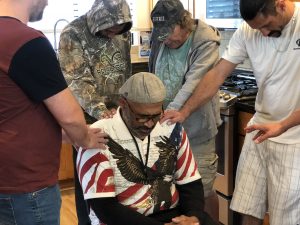Director’s Note
Resolving conflict, preparing for the future

At the Mission we strive to make our Life Recovery Program holistic. What that means is we don’t just focus on one thing when it comes to recovery. We address the whole person, and address the issues as if they were interconnected.
For instance, most of our clients have experience with homelessness, so we want to address the root issues that contribute to that. Most of our clients have destructive habits. Those habits meet a need, and we want to help our clients meet those needs the way God designed, not through addiction. Most of our clients have fractured employment history. Through education opportunities at the Center for Employment Training or Allan Hancock, or vocational training at Central Coast Super Thrift, our clients leave us better equipped to compete and succeed in the work force. The needs that bring our clients in are all addressed, and that together forms a healthier and more productive person.
One of the most consistent patterns our clients share is how they react when conflict happens. For the sake of clarity, let’s call these collective gentlemen “Matthew.” Whenever Matthew faces a disagreement he can’t ignore or forget, he runs. Whether it’s conflict at home, at work, among friends, or at church, he runs. Matthew may have the best attitude at an outreach, he may cook elaborate meals for his fellow clients, and he may turn in his homework on time every week. But a holistic program means Matthew needs to work on resolving conflict in a healthy way. Luckily for Matthew, Jesus addresses this very issue.
In Matthew Chapter 18, Jesus is preparing his followers to be without Him. When he first meets them, His disciples are kind of ragamuffins. However messed up their lives are though, they’re willing to humble themselves and learn (like Matthew!). Jesus knows His disciples will become Apostles and start the Church. Jesus doesn’t want His church to be destroyed from the inside out when the inevitable disagreements come up, so He teaches them how to handle any issue that might come up.
“If a fellow believer hurts you, go and tell him—work it out between the two of you. If he listens, you’ve made a friend. If he won’t listen, take one or two others along so that the presence of witnesses will keep things honest, and try again. If he still won’t listen, tell the church. If he won’t listen to the church, you’ll have to start over from scratch, confront him with the need for repentance, and offer again God’s forgiving love.” Matthew 18:15-17
Parents know, there’s nothing more frustrating than teaching conflict resolution. It takes a long time, it’s labor-intensive, and it requires lot of grace. Matthew is frustrated that he was spoken to with disrespect by another client. When he finally conveys to that other client why he’s upset and what he wants in return (an apology), it will be the most honest he’s been in years. That client will apologize, the drama will be over, and clients and staff will go their separate ways.
The rage Matthew felt will subside, and he will be at peace. But Matthew will start to reflect on what it took to get to that peace. It required from him grace, and courage, repentance, and intimacy. He will want more of it. It will be easier to apologize when he offends someone.
What Matthew doesn’t realize yet is it will help him in his addiction recovery as well. He will be more sensitive to urges and cravings. He will be more likely to reach out for help, having experienced healthy vulnerability. He’ll have more empathy with people who don’t think the way he does. He’ll be a better caregiver for family, too. When disagreements come up, the walls come down. A careless remark is made and (sometimes) months of pressure gets released. We finally get to have honest conversation. And God finally gets to have His way with us.
Blessings,
Chris Rutledge
Director
